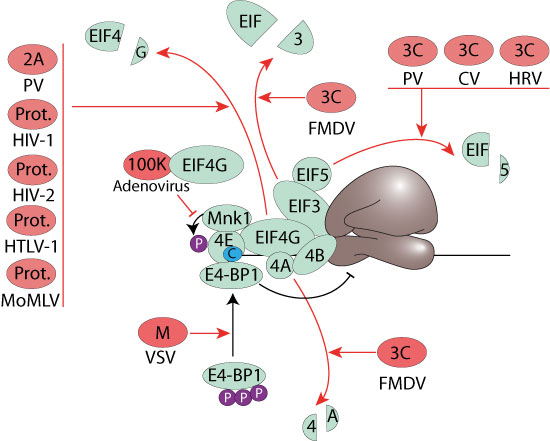Inhibition of eukaryotic host translation factors by virus (kw:KW-1075)
The majority of cellular mRNAs initiate translation through the recruitment of the eukaryotic translation initiation factor 4F (eIF4F) to the 5' cap of the mRNA. eIF4F consists of the cap-binding protein eIF4E, the RNA helicase eIF4A, and the adapter protein eIF4G.

Viruses have evolved ways of interacting with the host translational machinery to shutoff host gene expression. This global inhibition of cellular protein synthesis serves to ensure maximal viral gene expression and to evade host immune response.
Dephosphorylation of host translation factors is one of the strategies employed by viruses.
Some RNA viruses like VSV, poliovirus, and encephalomyocarditis virus dephosphorylate the eIF4E binding protein (4E-BP1). Following infection of cells with influenza virus, unphosphorylated eIF4E accumulates and leads to the inhibition of host protein synthesis. PB2 polymerase seems to allow the virus to express its proteins despite the host translation shutoff
 .
.
Infection with adenovirus provokes strong eIF4E dephosphorylation, which is caused by the displacement of Mnk1 from the eIF4F complex by the binding of adenovirus 100kDa protein to the C-terminus of eIF4G. Late viral mRNAs can still be expressed thanks to a specific 5'-UTR sequence promoting initiation by ribosomal shunting
 .
.
Late in the infection with SV40, host cell translation is also shut off via dephosphorylation of eIF4E and 4E-BP1. In this case again, the virus uses an independent system to express its late product, probably through an IRES
 .
.
Another strategy consists in cleaving the host initiation factors. The central role of eIF4G in initiation makes it a valid target for inhibiting host translation. Therefore, proteases of some retroviruses and picornaviruses shut off host translation by cleaving host eIF4G.
Viruses inhibiting host translation factors:
| Family | Virus | Viral protein | Host factors inhibition strategy | references |
| Picornaviridae | poliovirus, Coxsackie B virus and rhinovirus | Protease 3C | Cleavage of eIF5B |

|
| Foot-and-mouth disease virus | Protease 3C | Cleavage of eIF3a, eIF3b, and eIF4A |

|
|
| Encephalomyocarditis virus, poliovirus | Protease 3C | Dephosphorylation of eIF4E and 4E-BP1 |


|
|
| Retroviridae | HIV-1 | Protease | Cleavage of eIF4GI |

|
| HTLV-1 | Protease | Cleavage of eIF4GI |

|
|
| Moloney murine leukemia virus | Protease 3C | Cleavage of eIF4GI and eIF4GII |

|
|
| Rhabdoviridae | Vesicular stomatitis virus | Matrix protein | Dephosphorylation of 4E-BP1 via AKT inactivation |


|
| Orthomyxoviridae | Influenza virus | ? | Dephosphorylation of of eIF4E |

|
| Polyomaviridae | SV40 | Small T antigen | Dephosphorylation of 4E-BP1 |

|
| Adenoviridae | Adenovirus | L4-100kDa | Dephosphorylation of eIF4E |


|
Matching UniProtKB/Swiss-Prot entries
(all links/actions below point to uniprot.org website)13 entries grouped by protein
2 entries
Protein OPG173
11 entries
